| Srl | Item |
| 1 |
ID:
125849
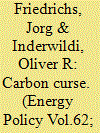

|
|
|
|
|
| Publication |
2013.
|
| Summary/Abstract |
The carbon curse is a new theory, related to but distinct from the resource curse. It states that fossil-fuel rich countries tend to follow more carbon-intensive developmental pathways than [if they were] fossil-fuel poor countries, due to a hitherto unappreciated syndrome of causal mechanisms. First, fuel rich countries emit significant amounts of CO2 in the extraction of fuel and through associated wasteful practices such as gas flaring. Second, easy access to domestic fuel in such countries leads to crowding-out effects for their energy mix and economic structure (for example, abundant oil may displace other fuels from the energy mix and lead to the "Dutch Disease"). Third, fuel abundance weakens the economic incentive to invest in energy efficiency. Fourth, governments in fuel rich countries are under considerable pressure to grant uneconomic fuel consumption subsidies, which further augments the carbon intensity of their economic output. Due to the combined effect of these causal mechanisms, it is genuinely difficult for fuel rich countries to evade carbon-intensive developmental pathways. And yet there are remarkable exceptions like Norway. Such positive outliers indicate that the carbon curse is not destiny when appropriate policies are adopted.
|
|
|
|
|
|
|
|
|
|
|
|
|
|
|
|
| 2 |
ID:
114652
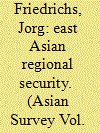

|
|
|
|
|
| Publication |
2012.
|
| Summary/Abstract |
The "ASEAN family" of regional security institutions has a mixed record: it has proved
very helpful in improving interstate trust, fairly helpful in managing peaceful change,
somewhat helpful in enhancing regime stability, but virtually useless in resolving
interstate conflict. Overall, East Asia remains dominated by conventional forms of
international relations.
|
|
|
|
|
|
|
|
|
|
|
|
|
|
|
|
| 3 |
ID:
079489
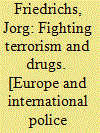

|
|
|
|
|
| Publication |
London, Routledge, 2008.
|
| Description |
xvi, 280p.
|
| Standard Number |
9780415408929
|
|
|
|
|
|
|
|
|
|
|
|
Copies: C:1/I:0,R:0,Q:0
Circulation
| Accession# | Call# | Current Location | Status | Policy | Location |
| 052921 | 363.23/FRI 052921 | Main | On Shelf | General | |
|
|
|
|
| 4 |
ID:
097436
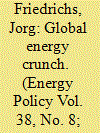

|
|
|
|
|
| Publication |
2010.
|
| Summary/Abstract |
Peak oil theory predicts that oil production will soon start a terminal decline. Most authors imply that no adequate alternate resource and technology will be available to replace oil as the backbone resource of industrial society. This article uses historical cases from countries that have gone through a similar experience as the best available analytical strategy to understand what will happen if the predictions of peak oil theorists are right. The author is not committed to a particular version of peak oil theory, but deems the issue important enough to explore how various parts of the world should be expected to react. From the historical record he is able to identify predatory militarism, totalitarian retrenchment, and socioeconomic adaptation as three possible trajectories.
|
|
|
|
|
|
|
|
|
|
|
|
|
|
|
|
| 5 |
ID:
092086
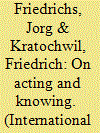

|
|
|
|
|
| Publication |
2009.
|
| Summary/Abstract |
This article moves from deconstruction to reconstruction in research methodology. It proposes pragmatism as a way to escape from epistemological deadlock. We first show that social scientists are mistaken in their hope to obtain warranted knowledge through traditional scientific methods. We then show that pragmatism has grown from tacit commonsense to an explicit item on the agenda of the international relations discipline. We suggest that a coherent pragmatic approach consists of two elements: the recognition of knowledge generation as a social and discursive activity, and the orientation of research toward the generation of useful knowledge. To offer a concrete example of what pragmatic methodology can look like, we propose the research strategy of abduction. We assess various forms of research design to further elucidate how pragmatic research works in practice.
|
|
|
|
|
|
|
|
|
|
|
|
|
|
|
|